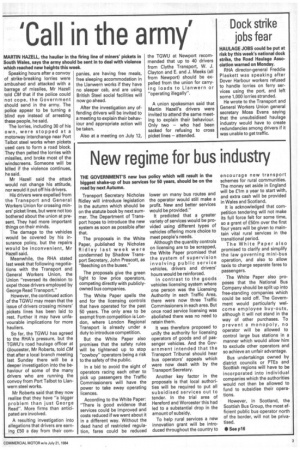New regime for bus industry
Page 5

If you've noticed an error in this article please click here to report it so we can fix it.
THE GOVERNMENT'S new bus policy which will result in the biggest shake-up of bus services for 50 years, should be on the road by next Autumn.
Transport Secretary Nicholas Ridley will introduce legislation in the autumn which should be on the statute book by next summer. The Department of Transport hopes to introduce the new system as soon as possible after that.
The proposals in the White Paper, published by Nicholas Ridley last week were condemned by Shadow Transport Secretary, John Prescott, as "Beeching on the buses."
The proposals give the green light to low price operators, competing directly with publiclyowned bus companies.
The White Paper spells the end for the licensing controls that have operated for the past 50 years. The only area to be exempt from competition is London, where London Regional Transport is already under a duty to introduce competition.
But the White Paper also promises that the safety rules will be tightened up to stop "cowboy" operators being a risk to the safety of the public.
In a bid to avoid the sight of operators racing each other to pick up passengers the Traffic Commissioners will have the power to take away operating licences.
According to the White Paper: "There is good evidence that services could be improved and costs reduced if we went about it in a different way. Without the dead hand of restricted regulation, fares could be reduced lower on many bus routes and the operator would still make a profit. New and better services would be provided."
It predicted that a greater variety of services would be provided using different types of vehicles offering more choice to meet people's needs.
Although the quantity controls on licensing are to be scrapped, the White Paper promised that the system of supervision involving public service vehicles, drivers and drivers' hours would be reinforced, In contrast to the goods vehicles licensing system where one person was the Licensing Authority in each Traffic Area, there were now three Traffic Commissioners in each area. But once road service licensing was abolished there was no need to retain them.
It was therefore proposed to unify the authority for licensing operators of goods and of passenger vehicles. And the Government intended that the Transport Tribunal should hear bus operators' appeals which were now dealt with by the Transport Secretary.
Another key factor in the proposals is that local authorities will be required to put all subsidised services out to tender. In the trial area of Hereford and Worcester this had led to a substantial drop in the amount of subsidy.
To help rural services a new innovation grant will be introduced throughout the country to encourage new transport schemes for rural communities. The money set aside in England will be Elm a year to start with, and extra cash will be provided in Wales and Scotland.
It is acknowledged that competition tendering will not make its full force felt for some time, so a grant of £50m over the first four years will be given to maintain vital rural services in the transitional period.
The White Paper also promised to clarify and simplify the law governing mini-bus operation, and also to allow taxis to charge separate fares to passengers.
The White Paper also proposes that the National Bus Company should be split up into free-standing companies which could be sold off. The Government would particularly welcome employee buy-outs, although it will not stand in the way of other purchases. To prevent a monopoly, no operator will be allowed to control large bus stations in a manner which would allow him to exclude other operators and so achieve an unfair advantage.
Bus undertakings owned by district councils or PTEs and Scottish regions will have to be incorporated into individual companies which the authorities would not then be allowed to fund to subsidise their operations.
However, in Scotland, the Scottish Bus Group, the most efficient public bus operator north of the border, will not be privatised.
• See p16




















































































